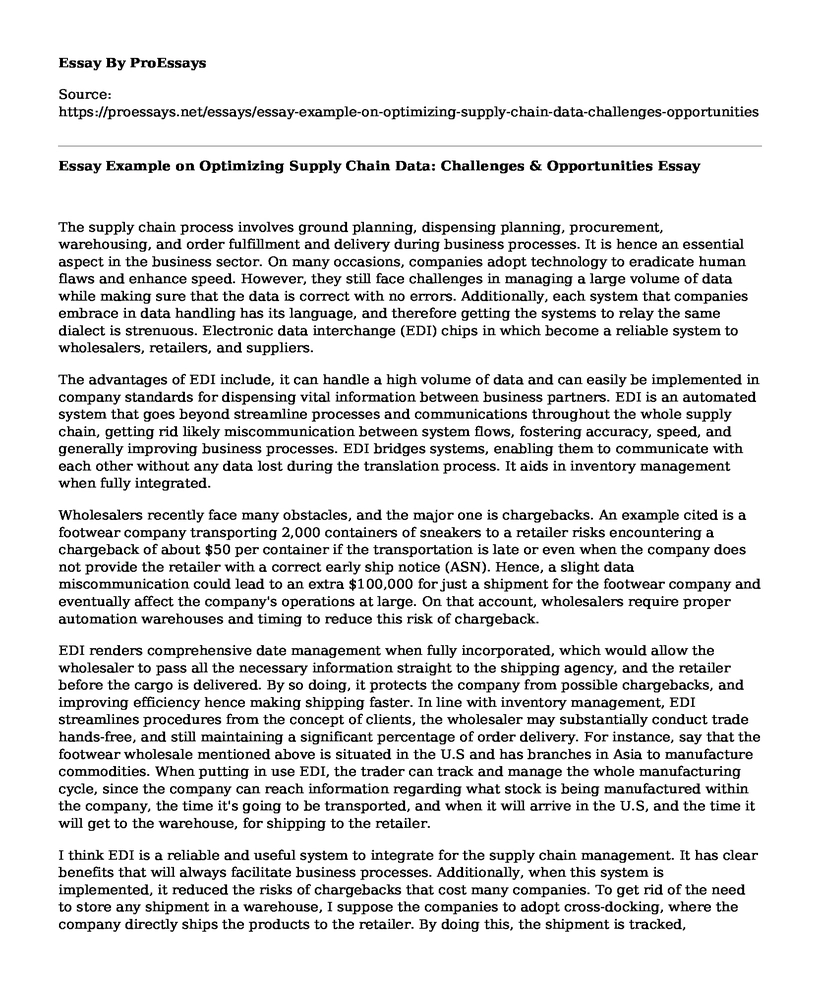The supply chain process involves ground planning, dispensing planning, procurement, warehousing, and order fulfillment and delivery during business processes. It is hence an essential aspect in the business sector. On many occasions, companies adopt technology to eradicate human flaws and enhance speed. However, they still face challenges in managing a large volume of data while making sure that the data is correct with no errors. Additionally, each system that companies embrace in data handling has its language, and therefore getting the systems to relay the same dialect is strenuous. Electronic data interchange (EDI) chips in which become a reliable system to wholesalers, retailers, and suppliers.
The advantages of EDI include, it can handle a high volume of data and can easily be implemented in company standards for dispensing vital information between business partners. EDI is an automated system that goes beyond streamline processes and communications throughout the whole supply chain, getting rid likely miscommunication between system flows, fostering accuracy, speed, and generally improving business processes. EDI bridges systems, enabling them to communicate with each other without any data lost during the translation process. It aids in inventory management when fully integrated.
Wholesalers recently face many obstacles, and the major one is chargebacks. An example cited is a footwear company transporting 2,000 containers of sneakers to a retailer risks encountering a chargeback of about $50 per container if the transportation is late or even when the company does not provide the retailer with a correct early ship notice (ASN). Hence, a slight data miscommunication could lead to an extra $100,000 for just a shipment for the footwear company and eventually affect the company's operations at large. On that account, wholesalers require proper automation warehouses and timing to reduce this risk of chargeback.
EDI renders comprehensive date management when fully incorporated, which would allow the wholesaler to pass all the necessary information straight to the shipping agency, and the retailer before the cargo is delivered. By so doing, it protects the company from possible chargebacks, and improving efficiency hence making shipping faster. In line with inventory management, EDI streamlines procedures from the concept of clients, the wholesaler may substantially conduct trade hands-free, and still maintaining a significant percentage of order delivery. For instance, say that the footwear wholesale mentioned above is situated in the U.S and has branches in Asia to manufacture commodities. When putting in use EDI, the trader can track and manage the whole manufacturing cycle, since the company can reach information regarding what stock is being manufactured within the company, the time it's going to be transported, and when it will arrive in the U.S, and the time it will get to the warehouse, for shipping to the retailer.
I think EDI is a reliable and useful system to integrate for the supply chain management. It has clear benefits that will always facilitate business processes. Additionally, when this system is implemented, it reduced the risks of chargebacks that cost many companies. To get rid of the need to store any shipment in a warehouse, I suppose the companies to adopt cross-docking, where the company directly ships the products to the retailer. By doing this, the shipment is tracked, controlled, and delivered without seeing nor touching the products. I think companies should also search for solutions that are modeled to be ready-to-use hence allowing creating more room to work with any other trader without acquiring extra development.
Therefore, I suppose wholesalers and suppliers will benefit when they incorporate the EDI program that saves them from chargebacks and ensures timely delivery of cargo to the desired retailer.
Reference
Implementing Fully Integrated EDI for Supply Chain Efficiency. (n.d.). Retrieved from https://www.supplychainbrain.com/articles/24700-implementing-fully-integrated-edi-for-supply-chain-efficiency
Cite this page
Essay Example on Optimizing Supply Chain Data: Challenges & Opportunities. (2023, May 23). Retrieved from https://proessays.net/essays/essay-example-on-optimizing-supply-chain-data-challenges-opportunities
If you are the original author of this essay and no longer wish to have it published on the ProEssays website, please click below to request its removal:
- Competitors Analysis and Market Structure of Starbucks Paper Example
- Classical Conditioning and Operant Conditioning in the Media Essay
- Best Laptop Infomercial - Speech Example
- Essay Example on Most Suitable Org for Diabetes Treatment: Mayo Clinic
- Tencent's Rise: Leadership, Change Management and Restructuring - Essay Sample
- Research Paper on Exploring Vancouver Aquarium: A Conservation-Based Initiative
- Essay Sample on Attracting Talent: Crafting an Organization to Perform Well







